Whether you are researching to buy an RV generator or currently own one and need to maintain it, here is everything you need to know about generators.
The Benefits of Having a Generator in Your RV
Generators are a power source when and where there is no power. We rely on them for emergency power in situations such as bad weather. Having a generator in your RV not only gives you power during an outrage but also for all those who love boondocking and camping more of the off-beat campsites.
Without solar or shore power, we are limited to the power stored in our RV batteries. This may only amount to a few hours in the case of using power-consuming items. Not to mention you are without air conditioning and the convenience of 120-volt items.
An RV generator gives you peace of mind in the case of power outages knowing your heat or air conditioning will still work and you will have hot water and safe food storage. The other huge benefit is freedom! With a generator, you will have power wherever you go.
Built-in versus Portable
There are two categories RV generators will fall into: built-in or portable.
For many motorhomes and higher-end towables, built-in RV generators are standard or an option that comes conveniently wired and secured within the RV. A great benefit of built-ins is that, in the case of motorhomes, they generally use the fuel from your RV fuel tank, meaning you have no fuel cans to carry with you.
For those RV owners without a built-in, there are lots of options for your portable RV generator. Portable generators allow you to choose which size you want (or need) and give you the option to use your generator for uses other than RVing.
If you have the option of a factory or dealer-installed onboard RV generator, it’s worthwhile looking at the cost difference of buying the generator separate from the dealer and having it installed yourself after purchase.
What Are Fuel Sources for Generators?
When it comes to fuel for your generator there will be three possibilities: gasoline, diesel, or propane.
The most common is gasoline and some manufacturers are now combining gas and propane for a dual fuel RV generator option.
Gasoline and diesel are readily available and filling up your fuel cans can be conveniently done when you fill up your rig. Fuel prices vary from state to state and month to month and so costs will vary accordingly. In most cases, a gasoline generator will produce more power than a similar propane-powered generator.
Propane burns cleaner without the familiar smell of a gas-burning engine. A propane generator for your RV will also run longer before needing refueling due to the fact they will most likely be connected to a BBQ size propane tank.
Champion’s Dual-Fuel model has become very popular since its introduction a few years ago. Having the option to flip a switch to change fuel sources allows you to choose whichever is convenient and available. Run out of gas? Hook up your propane tank, flip the switch and you’re set.
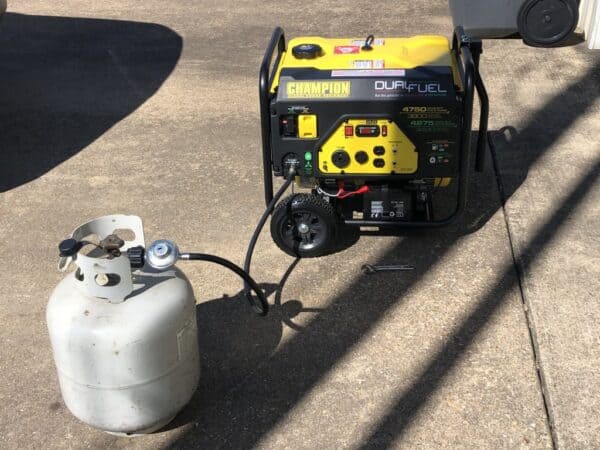
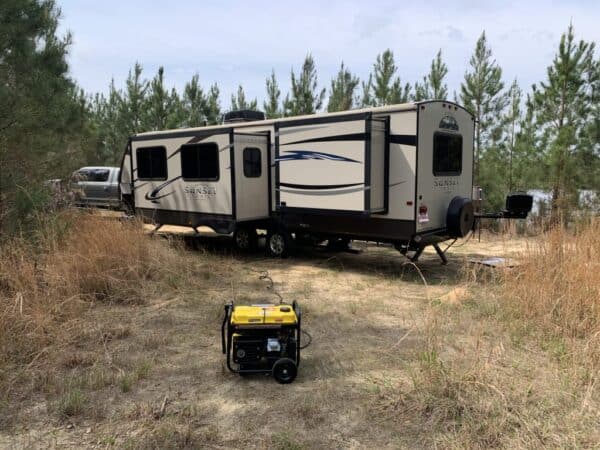
How to Determine Your RV Generator Capacity Needs
When looking to buy an RV generator the most common thing you will come across discussed and advertised is watts. Generators are rated in watts which is the amount of energy they are able to provide. You will see two ratings on most generators: starting watts and running watts.
Starting watts will be a higher number and is the maximum power the generator can provide for a short burst.
The running or continuous watts value will be the lower of the two and is the power the generator will supply continuously for extended periods.
What size generator do I need for my RV?
If you add up all of the power requirements of items in your RV, this will be the total power required in watts. Here are some common running wattage numbers for RV appliances and items you will likely need. Keep in mind these are averages and your numbers will vary.
Another important consideration is some items can require double the wattage on startup.
Common running wattage values for RV appliances
- Fridge – 200-watts
- Furnace – 75-watts
- Electric Water Heater – 1250
- Air Conditioner (13,500 BTU) – 1250-watts
- Light bulb (non LED) – 1.5-watts
- Coffee maker – 850-watts
- TV – 250-watts
- Microwave – 1000-watts
Before purchasing a generator you will want to calculate how many watts and, in turn, what size generator you require. The main consideration as seen above will be your RV air conditioner. If you don’t require your air conditioner then this will greatly reduce the size of the generator you need.
The smaller generators you see with a single carrying handle and really low noise outputs are generally your inverter generators in the 2000 watt range. These are great for powering the necessities but will not handle the power required to start and continuously run your A/C. Running in parallel doubles your power with a second generator. This option of course means purchasing and maintaining two generators.
In general, if you want to run your RV air conditioner, you will be looking at a 3000 plus watt generator at a minimum. These start to become larger and most require two people to move around. There are options for some larger inverter-style generators in the wattage range needed to operate air conditioners but many tend to be conventional above a certain number.
Conventional versus Inverter
This can be a hot topic among RVers. There are two main categories of generators those being conventional and inverter.
Conventional generators are most often larger, surrounded by a steel frame, and pretty loud.
Inverter generators are often small enough to be handled by a single person and most have a plastic case. They also run noticeably quieter than conventional generators.
Although conventional generators are cheaper than inverter generators on a price for power output scale, they are not ideal for small electronics and sensitive circuits. This is why many RVers and dealers suggest inverter-style generators.
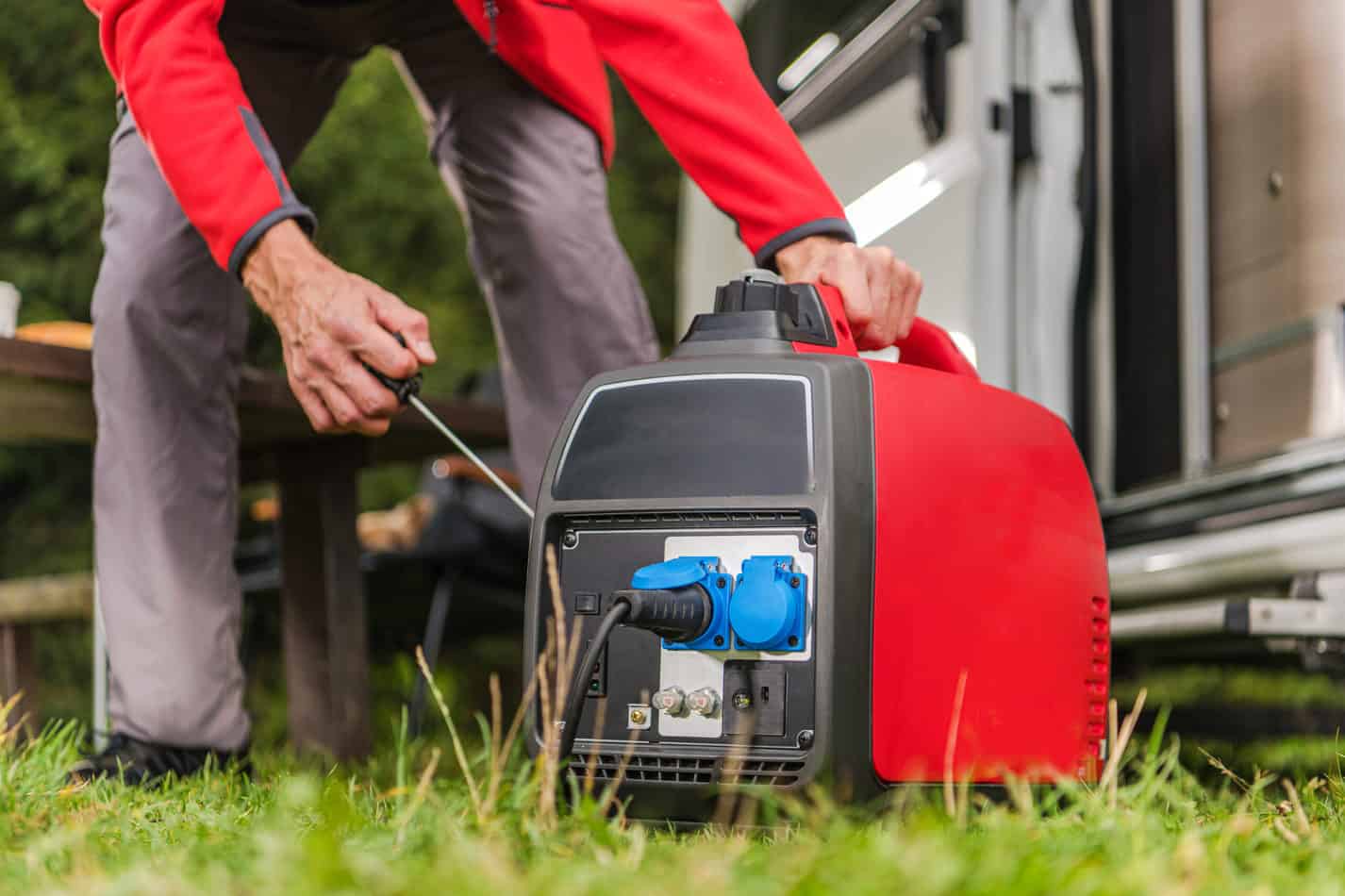
RV inverter generators provide “clean power”, if you will, by controlling the power output with the power is needed. This results in an even power flow and a more efficient generator since it only runs as hard as your power requirements call for.
A conventional generator, on the other hand, runs at a constant speed and power output. This can possibly lead to a power surge to certain items. Since the power is continuously at full so is the rpm and noise output.
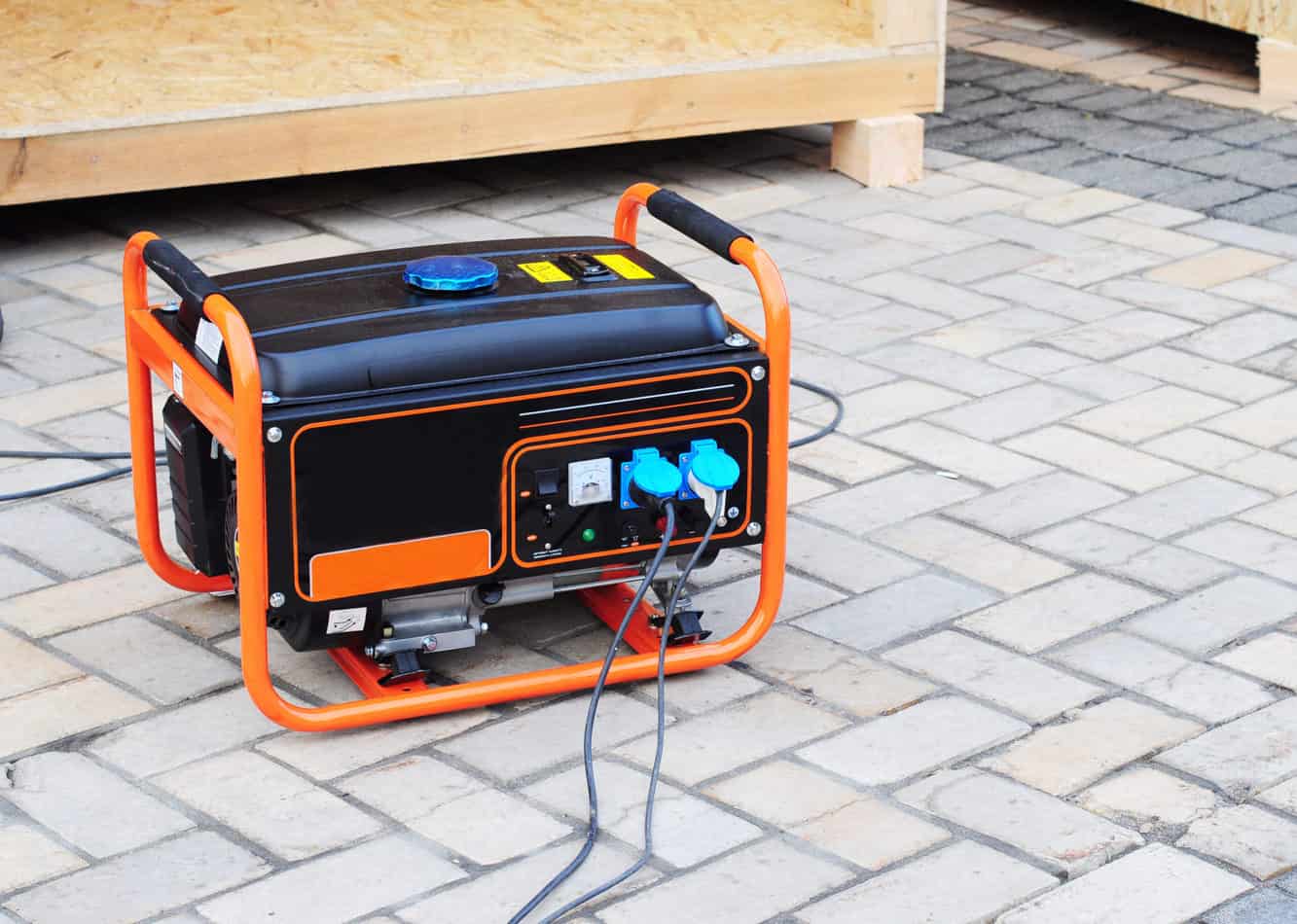
Maintenance Needs for Generators
Generators, like all things mechanical require maintenance. They are, however, designed to run with no major work needed to be done for years. Proper maintenance will ensure this is the case.
Like your tow rig, oil changes and filter changes are the main maintenance items you will be looking at. Both are easy and relatively cheap to perform. This is why most RVers choose to service their own RV generators.
As with any maintenance, tracking is key. Following the manufacturer’s recommended service intervals is important. Many generators have hours trackers and so it’s easy to know when it’s time for service. Whether you have a built-in or portable RV generator the maintenance requirements are similar.
If you only camp a couple of times a year it is best to service your generator between seasons regardless of hours. Gas stored for long periods can be bad news for a generator. Most manufacturers offer a maintenance kit with everything needed for your service.
Exercising your generator
As part of your preventive maintenance, you should exercise your generator periodically when not in use. If it is convenient to do so, a start-up and run for a few minutes monthly will ensure your generator is ready to go when called for.
A stored generator can accumulate moisture over time if not run. Gas also breaks down when stored for longer periods and so, if your generator has sat with gas in it, the general consensus is to drain it and fill it with fresh fuel before use.
Once you have experienced the convenience and practicality an RV generator offers it is hard to go back. For those looking at buying a generator do your research and get the generator that will provide you the power you require. Follow that up with regular maintenance and you will never be without power!

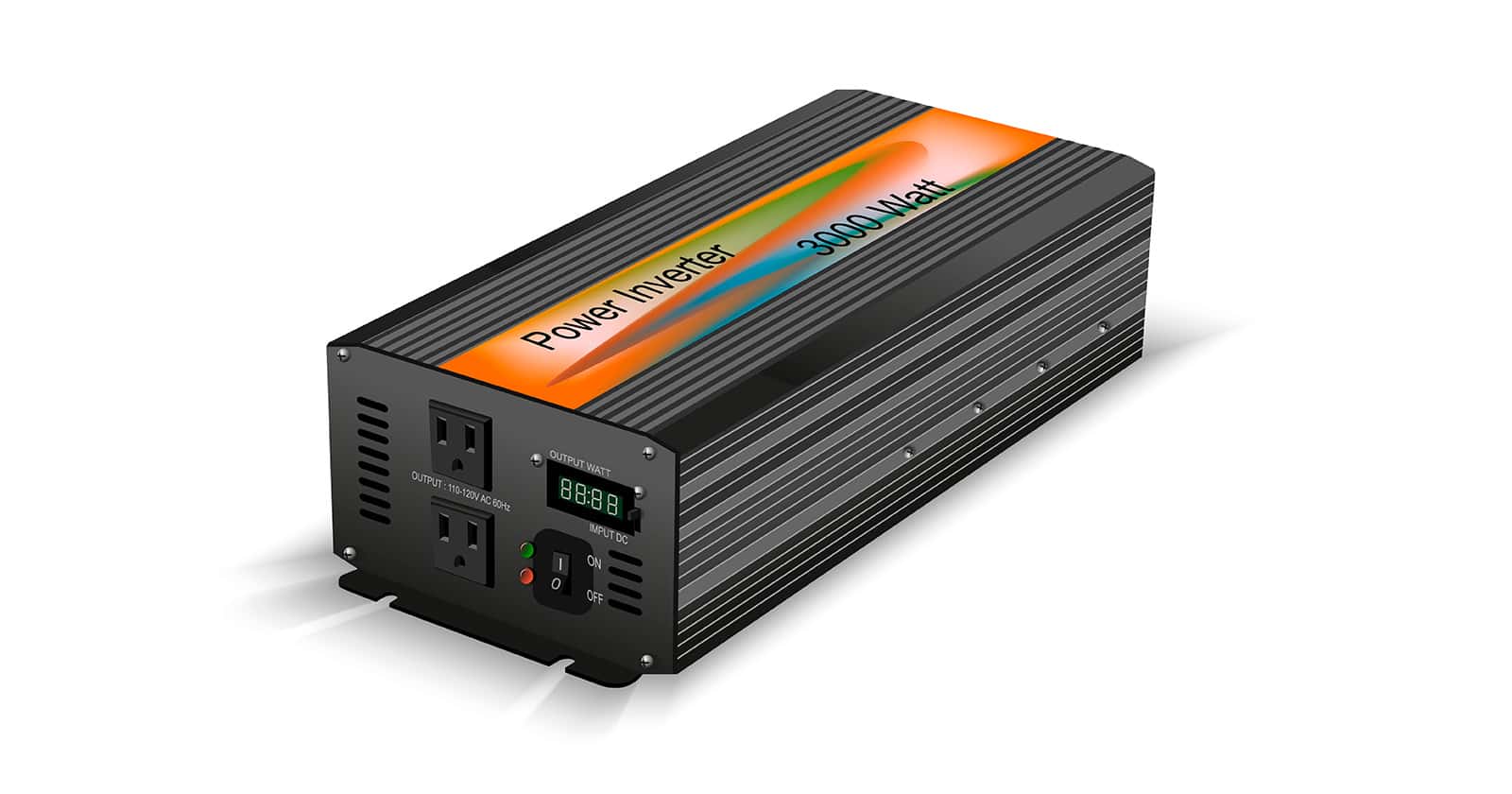



This an informative article all around. Thanks.
The principle shortcoming with this article and with the information you’re likely to get at an RV show from the generator sales people is that the wattage numbers provided are for generators working at sealevel where there’s the highest amount of oxygen in the air. The higher you go the less oxygen and the less lower the generator can put out. Camping anywhere above 4000 ft. renders most of the quiet 1800-2000 starting wattage inverter generators practically useless for anything save running a microwave when nothing else is running and for recharding the batteries. Forget running even the smallest AC unit. You will need to daisy chain 2, $2000 inverter generators to use any other appliances, let alone the AC unit.
Hey Stewart, this is great information to know!
Would love to see articles about adding solar, best panels for RVs, DIY vs factory or other prof installed, pros and cons of incorporating with a generator, and articles about lithium deep cycle & starting batteries, espec re DETAILED safety issues. Thx
Hey Steven, thanks for your suggestion! We will definitely add those topics to the list.
Did i miss it in article?
Think on most GenSets if running propane or natural gas you need to de-rate output by about 10%.
Also with Nat Gas/propane they tend to run quieter (relative term for mist if these except Hondas) and cleaner and oil changes can go from 1 every 25 hours to 1 every 100 hours. Be sure to NOT let it run out of oil and most now have a low oil shut off switch.
WARNING-if using in a cold climate remember that the pressure in your propane tank will decrease as will it’s output.
I found this out in DFW during Freezemagedden and had to run 82 hours on gasoline as at below 32*, very little pressure/volume in BBQ tank.
Great information to be sharing. Thanks, Pitt!
You can get up to 9500 watts in an inverter generator.
https://www.harborfreight.com/electrical/generators/9500-watt-super-quiet-inverter-generator-with-co-secure-technology-57080.html
Rich
Also be sure and install an hour meter or somehow track usage.
ALSO GROUND THE UNIT
If something shorts and generator not grounded and YOU touch it, you just became ground and uf 240 volt-VERY BAD.
At camp site might try to ground thru eletrical plug at camp site or possibly water faucet or a ground rod.
BE SAFE AND NOT SORRY!!!
This article left out the most important part:
Be aware that generators are the antithesis of “camping.” They are noisy, polluting and utterly unnecessary for a wonderful camping experience. Many National Parks and monuments ban them except for a few hours each day and whole camping areas are designated as “generator free.”
That’s because generators really ruin the outdoor experience, the quiet, the sounds of wind and wildlife, by obliterating it with noise and the invariable muffler harmonics that make the darned thing oppressive annoying–even at the other end of the campground. And, invariably, one or more generator owners will run their units–against NFS rules–all day and all night, clueless as to to the effect on other campers.
Generators are fine for FEMA Resettlement Camps, Food Trucks and dispersed camping adjacent to large airports.
Generators can definitely ruin the camping experience in some instances. For some RVers though, they are a necessity – especially when boondocking.
Unfortunately California passed a bill banning all portable gasoline powered generators along with mowers, weed eaters and blowers. Propane would be the way to go in California I would think.
Good point, Ken! People in Cali will need to know this.
I have an Onan “Built-in” generator in my Coachman Freelander. It is unclear which is the source of power for the electric start: House battery or the vehicle’s engine?
Condemning generators so strongly and suggesting banishment to FEMA camps and adjacent airports is another NIMBY solution. They can be used responsibility while camping. As was said if one wants to guarantee no generators around them, then go to non generator campgrounds. Just my 2 cents.
Autonomous fuel-free generators are in development. They will be rated at 5 kW. One may fit in a cubic foot. The other is larger.
Click on aesopinstitute.org to learn more.
The compact one is a modern version of the Hubbard fuel-free generator which ran an electric boat on a lake in Seattle about 100 years ago.
These reflect little known disruptive science called Open Source Physics.
The first units could appear in the market at the end of next year. They will be inexpensive and run 24/7 if desired. There are no moving parts.
A Pitch Deck is available upon request.
I have a 2200 watt inverter live at 6000 ft. With a high altitude kit it runs my 9000 BTU air no problem.
That’s great!
This is good information… if you’ve accepted the notion that RVs have anything to do with camping. In my book, camping requires a nothing more than a tent and as much “stuff” as one can carry in a pack. Driving around in a hotel on wheels isn’t camping.
RVing definitely doesn’t mean camping anymore. Some people live in their RV full-time and would not consider their lifestyle “camping”.
Didn’t know that non LED light bulbs only use 1.5 watts. I assumed that a 100 watt light bulb uses 100 watts of electricity
What about the elements? Do they need protection from snow and rain. Nobody addresses this issue. Commercials show blizzards and thunder storms with generators/invertors out in the open with no kind protection.
In response to PITT, Grounding the generator frame is not necessary. I use 2 ea, 10KW with a 12 KW back up, propane powered generators to power my house in the event of an extended power loss. And I connect with a 4 wire 50 amp power cord with the proper safety connectors and disconnects. Check the existing electric code to see which your locality is using. The new code, NFPA 70, now wants all grounding to take place at a properly sized ground rod located at the source of power, and in my case, is the power panel for the house.
What about solar generators ?
No mention here
You’re right! We need a whole post for those.
What RV Furnace draws 750 watts?
Good catch, Dave. This is a typo.
I have found that my ONAN 4000 shuts down in high heat (95f and above) if I use regular ethanol gas. I switched to pure gas and it runs loads better without shutting down. I was also told the ethanol gas will ruin a generator.
For the occasional boondocker that has no interest in running appliances with a generator, and only wants to recharge batteries, what size generator is needed? I’m guessing one of the portable inverter generators is fall that is needed?